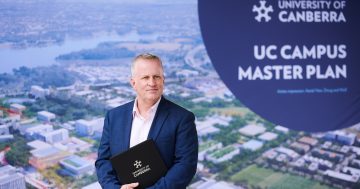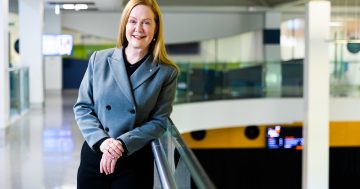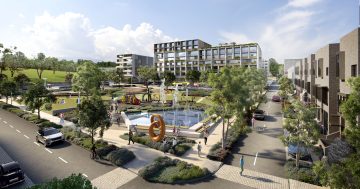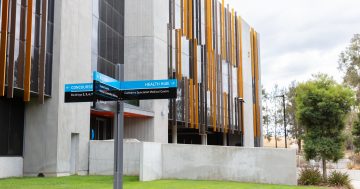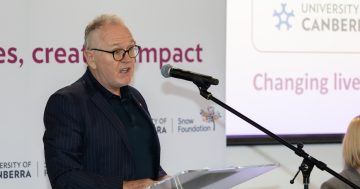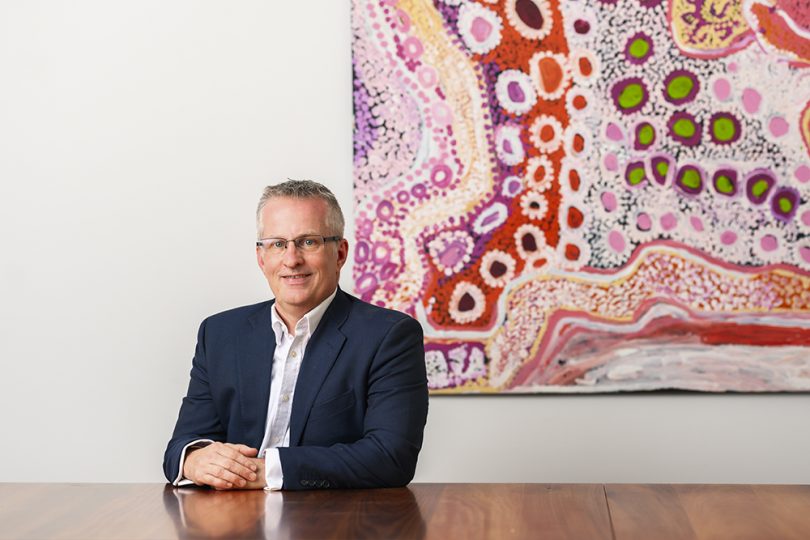
The new University of Canberra Vice Chancellor, Professor Paddy Nixon. Photo: Rohan Thomson.
The traditional definition of a university is an ivory tower, far removed from the everyday concerns of the world around it. But for the University of Canberra’s new vice-chancellor, Professor Paddy Nixon, that image couldn’t be further from the truth.
The university’s sixth Vice-Chancellor has a vision for a civic university, a place deeply grounded in its community and responding directly to its needs.
“We aspire to world-class research and recognition,” he says. “But we do that by looking at local problems like support for teachers in our schools, or engineering solutions to local environmental issues. We teach in the context of our community and we focus on supporting our community.”
It’s an idea the Irish-born academic is passionate about and he says the University of Canberra is already an excellent fit for the concept he first considered while at the University of Ulster.
Unusually for the United Kingdom, the university sits across multiple campuses, one situated only 6 km from the border with the Republic of Ireland. That means people from the university community crossed the border every day, creating a profound effect as the Brexit debate played out.
“We had to look at our mission and purpose,” he says. “There’s always a debate about what the value and purpose of a university degree is. But if you embed yourself in a community and find new opportunities to contribute to health, wellbeing, the cultural environment, these are things that will genuinely drive the university.”
When he arrived at the University of Canberra, Professor Nixon found an institution that was already deeply involved in everything from bushfire responses to COVID-19.
“I asked for a summary of how the university had responded to recent local issues. When the bullet points got to page six, I said OK, stop, I’ve got the message,” he laughs.
The list ranged from seconding key nursing academics into Canberra hospital trauma care, students undertaking roles in therapeutic goods, scientists and engineers looking at COVID-19 testing, engineering students creating prototypes for health shields and protective personal equipment, and delivering mobile health clinics for Indigenous communities.
Professor Nixon thinks this proactive approach to community can also be undertaken in faculties like arts, business, government and law.
“I want us to ask how crises affect democracy, resilience and capability,” he says.
A computer scientist by background and also the first in his family to attend university, Professor Nixon is a passionate believer in how technology can enhance and support life. He’s also fallen in love with Australia after an earlier stint at the University of Tasmania and is now an Australian citizen.
His vision for the University of Canberra is for an agile and flexible institution that responds well to challenges. And again, the response to COVID-19 has shown him how much potential there is for that to happen.
“We’ve gone from fully face-to-face pre-virus to remote learning in three weeks. That shows me we have an adaptable university that can respond in ways I wouldn’t have imagined was possible.
“So my next question is, how we take that civic university vision of a place that is for and from Canberra, and turn it into something that differentiates us nationally and internationally?”
The University was recently named on the UN’s top 200 list for sustainability goals and was placed 20th in the world on gender, a strong result for the university’s 50/50 by 2030 foundation headed by Virginia Haussegger.
“That’s a great example of what a university can do to challenge norms and have conversations about changing the world for the better. The University was prepared to do things differently with a research and civic engagement agenda”, Professor Nixon says.
In response to the COVID-19 crisis, the University of Canberra is implementing six-month short courses in areas of national priority such as health, digital communications and IT, with further opportunities in other areas to be rolled out from June.
“No Year 12 student – or anyone looking to reskill for life-long learning – will be left behind, with many alternative pathways for higher education,” Professor Nixon said.
“Here at the University of Canberra, we don’t believe ATAR scores provide the full picture, and we want to ensure that students out there who have the will to study and the initiative to work hard and apply themselves at university will have the opportunity to do so.”
Professor Nixon has also acknowledged the service of Interim Vice-Chancellor and President, Belinda Robinson, for guiding the university through bushfires and hailstorms, to the transition to a virtual campus due to the pandemic.












